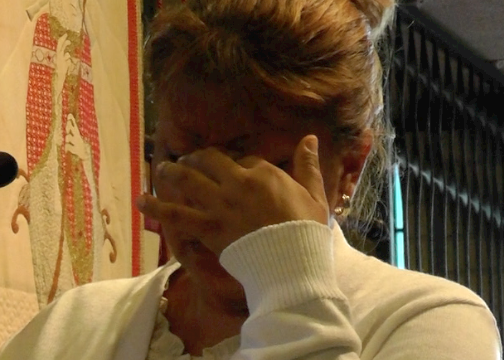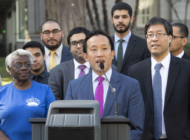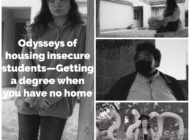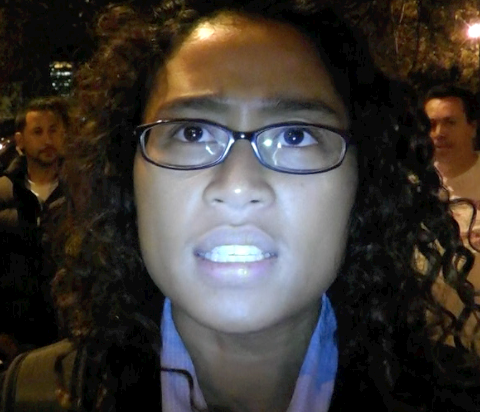By PAUL LAVERACK
POLITICAL MUSCLE
Scroll below for a short video on this story.
A crowd gathered at St. Anselm Episcopal Church in Anaheim, CA on September 27, 2011 to hear emotional testimony from Disneyland resort hotel workers about their experiences on the job, as part of a community forum focusing on the workers’ long-running and difficult contract negotiations with Disney. Their contract expired over three years ago, and since then, Disney workers have struggled to hold on to what Unite Here Local 11 organizer Francis Engler called, “two pillars of middle class life – the right to full-time employment, and the right to affordable family health insurance.”
Engler outlined the recent history of negotiations with Disney, which in 2008 made a contract offer which would “turn many full-time jobs into part-time jobs,” by transforming many positions from full-time status to something Disney calls “casual regular” employment. This would reduce the number of workers who qualify for benefits. In addition, Engler claimed that Disney wants sizable “takeaways in the healthcare the workers have depended on for years.” According to the union, the health insurance plan that Disney has offered their workers will substantially raise the employees’ expected contribution, up to $500 per month. “For workers making as little as nine dollars an hour,” Engler noted, “that’s impossible.”
Labor leaders as well as religious and civil society groups joined the workers at the forum, to express their outrage that Disney, an enormously profitable corporation built on a family-friendy image, could so mercilessly grind down their most impoverished workers. “This is not just a problem for the lowest-paid employees at Disney,” said Maria Elena Durazo, Secretary-Treasurer of the Los Angeles County Federation of Labor. “This is a crisis for every single one of us.”
“Nobody thought we’d be able to resist Disney’s attack on workers and their rights for such a long time,” said Tom Walsh, president of Unite Here Local 11, the union which organizes hotel workers in Los Angeles and Orange County. “We’ve managed to do it, not alone but with our community allies.”
Several of these allies were present to take part in a panel discussion, including Hussam Ayloush of the Council on American Islamic Relations, Rabbi Jonathan Klein of Clergy & Laiety United for Economic Justice, Victor Narro from the UCLA Labor Center, Madeline Rae Jensen of the California State Employees Association, and Professor Michael Montoya from UC Irvine.
“There’s nothing casual about the consequences of ‘casual labor,'” remarked Professor Montoya, an expert in public health, adding that Disney’s imposed changes to job conditions “amount to an attack on the workers’ ability to live.” Addressing the employees directly, Montoya said, “You are not just fighting for your health benefits. You are fighting for your lives.”
A number of workers gave personal testimony about their experience at Disney, and their concerns for the future. Isabel Barrera, a worker with eight years’ experience in the laundry department of the Disneyland Hotel, described how management has installed what she calls “an electronic whip,” in the form of giant video screens which provide a real-time rating of each worker’s efficiency. “Percentages like forty, sixty, eighty,” light up the screens, according to Montoya. “If we need to take a drink of water or use the bathroom, our numbers fall dramatically. The workers are encouraged to compete with each other, and our days of filled with stress and tension.”
Maria Navarro, a housekeeper for six years at the Grand California Hotel, spoke of injuring her back last year while lifting a mattress in the hotel. Since the injury, her life has plunged into a nightmare. “Disney won’t be flexible with me,” she said. “I want to work, but Disney won’t give me anything that accommodates the limitations due to my injury. My car was repossessed, my water was shut off a few days ago, and I fear the first of the month because I know I won’t have enough money to pay the rent.” She choked back tears, her voice halting. “There are days when my children ask what we are going to eat, and all I can say is, ‘I have no money.’ I feel like Disney has used me up, and thrown me away like trash.”
Steve Bracha, the head banquet captain at the Disneyland Hotel with eleven years on the job, detailed how there are times of year, such as Christmas, when the banquet halls are in less demand, so workers sometimes drop below the thirty-hour per week threshold needed to maintain their full-time status. As Bracha describes it, the company’s move to “casual regular” work status for its employees will cost him his seniority. “After that,” Bracha said, “Disney will be able to schedule me however they want. This means I will lose my house. I know that for a fact.”
Engler said the workers saw through the company’s claim of recessionary losses, noting how at the same time management was moving to cut access to healthcare and full-time work, CEO Bob Iger received an 11 percent raise, ballooning his salary to $30.6 million a year. In addition, the company made over $4.3 billion in profits in 2010, proving itself to be, as union president Walsh called it, “One of the most recession-proof companies out there.”
“This is an example of exactly what has gone wrong in our economy,” Engler said. “Profitable companies like Disney are replacing middle-class jobs with poverty jobs.”
See the short video below for more on this story.
Tags: afl anaheim bob iger California community forum corporate greed Disney Disneyland housekeepers labor local 11 maids union unite here workers




















